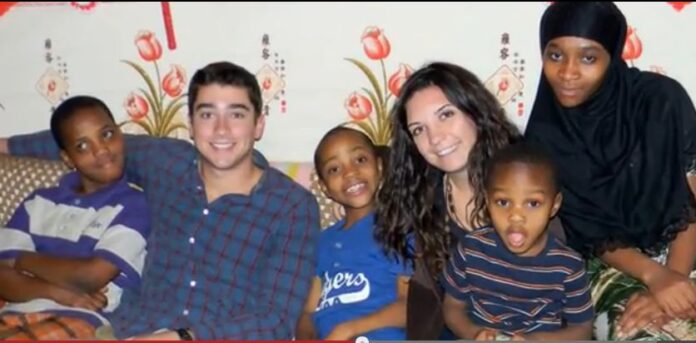
Every Wednesday evening, a dozen Virginia Tech students from a variety of majors come together with one common interest. They pile into cars and vans and head out to immerse themselves in a culture that is less than an hour away by car but worlds apart from their comfortable and often privileged life on campus.
Their destination is the Landsdowne Park housing project in northwest Roanoke where they volunteer their time to work with refugee families from countries in Africa. The weekly trek is part of the activities of the Coalition for Refugee Resettlement, a university-based partnership between students, community agencies, and nearby refugees. Volunteers offer hospitality and social support to the families as well as serve as tutors and teachers.
“Refugees have faced many different kinds of persecution and are among the most vulnerable people in society,” said Alejandra O’Connor, project coordinator with Americorps VISTA, which oversees the program. “The coalition helps these people build the skills they need to reach their goals in their new lives.”
“Coming to school is good because I have a teacher that helps me learn English,” one refugee said. “Before when I came to America I didn’t speak. Nothing. Now I speak English and can read and I talk to people, you know? It’s good to talk to neighbors and ask for help if you need it.”
It’s not uncommon for the refugees to have large families living in the two- and three-bedroom apartments Landsdowne provides. When student volunteers arrive for their weekly visit with their designated families, children – lots of them – start gathering in the main room. They seem to appear out of nowhere – sometimes upwards of 10 children in a family. Volunteers spend approximately 1 1/2 hours in the home serving as homework helpers. This involves anything from reading with the children to playing educational games to helping them keep track of their homework assignments.
Landsdowne Park is an older public housing development in Roanoke. Accommodations are modest, but the refugees have made it their home. Families have proudly infused their rich culture into each of their units with brightly colored drapes, tapestries, and African art on the walls and ceilings.
“I am humbled by this experience,” said Samantha Edwards of Stafford, VA, a junior majoring in human development at VA Tech’s College of Liberal Arts and Human Sciences. “These people are so grateful for what they have been given. They are amazing, resilient people.” Edwards serves as site leader for the Landsdowne group.
Site leaders are students who return for more than one semester. “The drive to help, that I see in them, is awesome,” O’Connor said.
The coalition oversees similar programs in two other neighborhoods as well. Twenty families were served during fall 2012 in a program that also offers weekly English and citizenship classes.
More than 200 individuals resettle in Roanoke each year, including refugees from Somalia, Burundi, Liberia, Sudan, Ethiopia, Haiti, and Bosnia, and Central America. Roanoke is one of approximately 50 designated resettlement cities in the Unites States.
There is such a need for in-home tutoring,” O’Connor said. “But the main expectation is that they will engage with the community they are serving.”
Because of the constant influx of new refugees needing attention, resettlement agencies typically provide short-term rather than long-term services. “We help fill in the gap in that we work with families who no longer receive direct assistance from the agencies,” O’Connor said.
Many of the volunteers are students enrolled in service-learning classes. These are courses that incorporate a community service experience of at least 15 hours. In fact, the coalition is an outgrowth of a project begun in 2005 by Michele James-Deramo, director of service learning for VT Engage, which is part of the university’s Outreach and International Affairs. Seeking to serve the influx of Somali Bantu refugees in Roanoke and Blacksburg, James-Deramo contacted the Roanoke Refugee and Immigrant Services (RRIS) office, and the resulting partnership was born.
“It is remarkable to witness the growth and interest across the university in the refugee outreach,” said James-Deramo. “There is a lot of talk about addressing compelling needs in communities. From the beginning, I feel that we have done that – responded to basic requests coming from one of the most vulnerable populations in our area.”
In addition to RRIS and the coalition, partners include the Roanoke Redevelopment and Housing Authority, the Star City Soccer Foundation, and the Catawba Sustainability Center.
O’Connor said the coalition is a win-win for everyone, especially the student volunteers.
“It allows them to step outside of their comfort zone,” she said. “It’s so easy for college students to just do things on campus. The coalition gives them a small glimpse into the bigger world out there.”
Some, but not all, of the student volunteers plan to pursue a career in social service. Regardless, all agree the experience was transformative.
“Virginia Tech is such a service-oriented school,” Edwards said. “It’s not just where you go to college for four years; it’s where you live. This experience has made me feel much more connected to the community.”
Resettlement typically involves moving people from developing countries to nations where the language, lifestyle, and economy are markedly different.
“Working with refuges is one of the most impactful community service activities for our students,” James-Deramo said. “Students who have participated in the program for multiple semesters have cited their work with the project as the most important learning experience they had while at Virginia Tech.”
Written by Catherine Doss.


